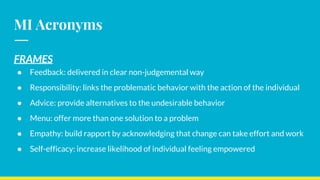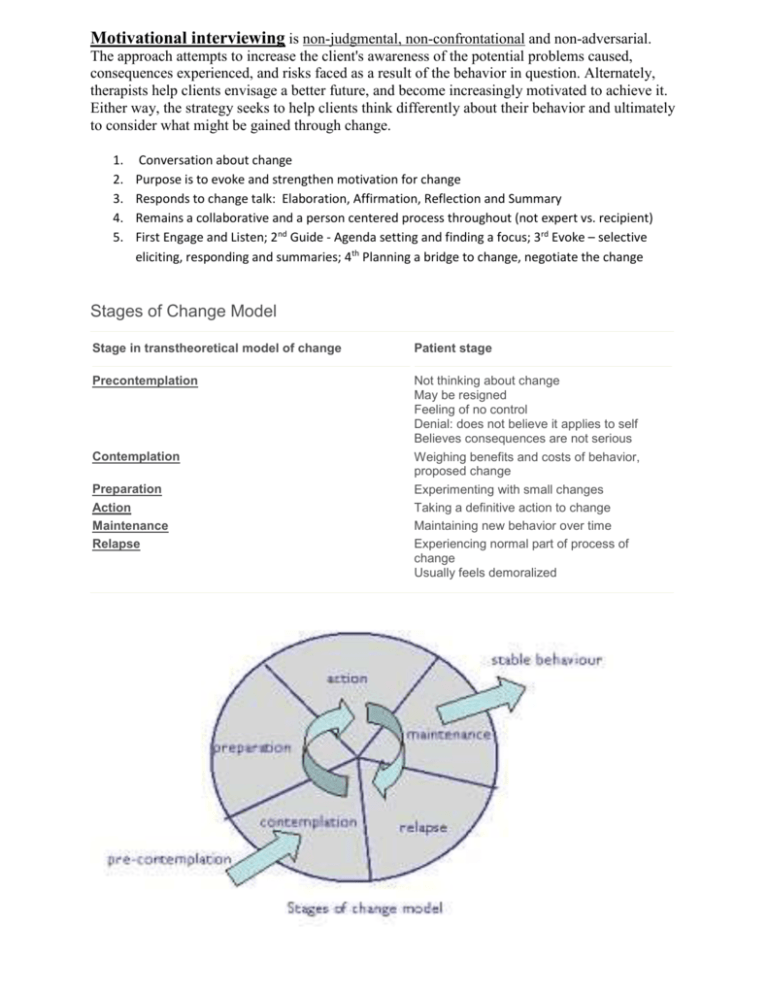Motivational Interviewing Techniques Are Best Described as Non Judgemental
Understand the patients own motivations. Motivational interviewing MI is a therapy approach that works on facilitating and engaging intrinsic motivation within a client in order to change behavior.

Motivational Interviewing Workshop
Express empathy- Empathize with the concern and explore.

. A trauma-informed approach recognizes that unless health professionals are aware of how trauma and adverse events. While it is goal oriented it is also client-centered meaning that the course is less directed by a therapist and focused on the level of the client. In a non-confrontational manner information that is contradictory is juxtaposed allowing the therapist to address discrepancies between what clients say and their behaviour without evoking defensiveness or resistance.
Rather than what problems bc that assumes. It is a directive strategy for talking to clients about resolution of ambivalence and to promote behavior change. You need to LISTEN more than speak.
The therapist and client are in more of a partnership rather than in an. - empathic non-judgmental stance. It will allow the therapist to see themselves from the clients eyes making it easier to understand the clients perspective.
Clients can identify and voice their own desires ability reasons and need for change. A nurse is utilizing Motivational Interviewing MI techniques while engaged in an encounter with a new mom struggling with SUD. The number of publications on MI has been doubling every 3 years and there are now MI trainers and translations in at least 38.
Resist the righting reflex which is when say we need to fix this as response to their issue. Motivational Interviewing techniques complement MI tools with more general approaches to facilitate change. Its efficacy has been demonstrated in numerous randomized trials across a range of conditions and settings 5-8.
Motivational Interviewing MI is a counseling style initially used to treat addictions 1-5. Change Talk Statements by the client revealing consideration of motivation for or commitment to change. Empathy can be one of the best methods for Motivational Interviewers.
Motivational interviewing has been widely used and adapted by therapists to overcome gambling issues it is used in collaboration with cognitive behavioral therapy and self-directed treatments. OARS Eliciting Change Talk Generating Commitment 1. Elicit ideas rather than advise.
D struggling with ambivalence. This is an interviewing conversation rather than expert-directed and elicits careful questioning and listening on both sides. A supportive patient-centered atmosphere is pivotal to MI where patients feel comfortable enough to explore their own reality and conflicts.
Motivational interviewing is a counselling method that involves enhancing a patients motivation to change by means of four guiding principles represented by the acronym RULE. The purpose is to strengthen the intrinsic motivation to change. Motivational Interviewing is NOT Nondirective Is not a technique or gimmick Is not a panacea often works best when blended with other Evidence Based approaches Is not a way of manipulating people into doing what you want Key Concepts.
Open-ended questions in motivational interviewing allow us to find out more about the clients perspective and ideas about change. Core MI techniques include. Motivational interviewing is a good way to do this and ensures that thoughts about changing and improving adherence become a central part of the conversation.
In the next session you will use these core skills plus selected tools that help patients better understand their competing priorities and ambivalence to changeto resolve their ambivalence and increase motivation for behavior change. Resist the righting reflex. Core motivational interviewing skills.
State are there any problems. Motivational interviewing clinical practice client-centered transtheoretical. Information is shared reciprocally and is non-judgmental.
Shows you recognize barriers the client faces. C integration of behavior change into a persons life. Part of a daily routine.
With issue resistance use key strategies of Motivational Interviewing MI. Motivational Interviewing goes well with the stages of change model. Introduction It has been 26 years since the first description of motivational interviewing MI appeared in this journal.
Motivational Interviewing is consistent with the style of client-centered psychotherapy. B not a good time to use MI techniques. Assures client is being heard and understood.
Motivational interviewing requires four key communication skills that support and strengthen the process of eliciting change talk also known as OARS. According to the Motivational Interviewing Network of Trainers techniques are designed based on a respectful and curious way of being with people that facilitates the natural process of change and honors client autonomy. The goal of using MI in an individual who is having issues with gambling is to recognize and overcome those barriers and increase overall investment in therapy by supporting an.
With the Columbo approach an interviewer makes a curious enquiry about discrepant behaviours without being judgmental or blaming. Collaborative rather than confrontational - Elicit ambivalence. Affirm strengths and movement in a positive direction.
And one of the things that is really special about motivational interviewing is that it works in a way which balances being directive with also being supportive and non-judgemental. Ask Open-ended questions rather than yesno questions. Over the past 15 years there have been considerable efforts to adapt and test MI across various chronic disease behaviors 79-21.
Using mi techniques the practitioner can tailor motivational strategies to the individuals stage of change according to the Prochaska and DiClemente model Table 112 Applications and effectiveness of motivational interviewing Recent meta. Motivational Interviewing can be used to explore someones ambivalence for change. With the spirit processes and techniques of MI ambivalence can be resolved.
Motivational interviewing is an approach to being with people in conversations to support them to make changes in their behaviour. The therapist needs to put himself in the clients position. In such situations the best way forward is to engage the patient in a conversation about this and to help them consider their options to change or stay the same.

Motivational Interviewing Is Non Judgmental Non

Strengths And Weaknesses Of Motivational Interviewing Download Table

Non Judgemental Acceptance Judgement Quotes Bible Judgement Quotes New Quotes
No comments for "Motivational Interviewing Techniques Are Best Described as Non Judgemental"
Post a Comment